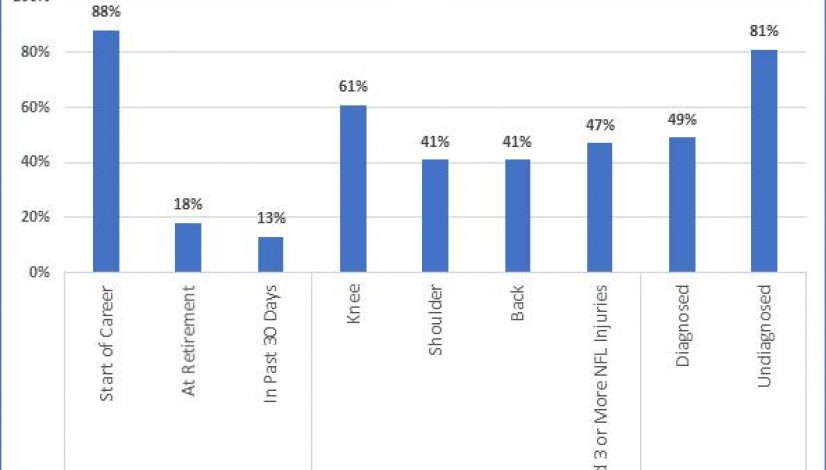The NFL’s Pot Problem
For decades, professional football players have habitually treated pain after games and practice sessions with everything from beers to over-the-counter anti-inflammatories or powerful prescription painkillers. The NFL’s dependence on drugs for pain management has drawn the attention of law enforcement, has been the subject of a federal lawsuit and is under investigation by the Drug Enforcement Administration.
How bad has it gotten? Consider that in a given season, the league overall averages a 100 percent injury rate: Even a team’s backups and third-stringers get hurt. Those casualties add up over time, with predictable results. A 2011 survey of more than 600 retired players by the Washington University School of Medicine (funded by ESPN) found that they used opioids at an overall rate four times that of the general US population. And no other major professional sport features so many outspoken proponents of cannabis’s medicinal qualities, which makes sense given that no other sport is so closely associated with pain and injury.
As noted in New Frontier Data’s “The Cannabis Industry Annual Report: 2017 Legal Marijuana Outlook,” Kannalife, a company founded in 2010, holds an exclusive license with the National Institutes of Health for the commercialization of US patent #6630507 (a cannabis patent held by the US government). Kannalife is focused on developing cannabis-based neuroprotective medicines for the treatment of hepatic encephalopathy and chronic traumatic encephalopathy (CTE).

As football fans and anyone who saw the 2014 feature film Concussion know, CTE has gained heightened visibility in recent years due to the number of current and former NFL players and other athletes who have been diagnosed with diseases linked to concussive impacts.
With increased public pressure to address the frequency of CTE and the abuse of prescription painkillers, the National Football League Players Association is looking to involve players’ families in the push for enlightened change in the NFL’s marijuana policy. While major obstacles remain, there is a definite movement in pro-football circles to change the way that cannabis is perceived and regulated by the league, which currently includes it on its list of banned substances.
Last spring, NFL Commissioner Roger Goodell said that he opposes letting players use pot recreationally, but that he is willing to listen to the league’s medical advisers on its potential value as a medicine. “To date,” Goodell insisted, “they haven’t said, ‘This is a change we think you should make that’s in the best interests of the health and safety of our players.’ If they do, we’re certainly going to consider that.”
But critics say that Goodell and the NFL have in fact been dragging their heels due to political and business pressure. The Trump administration’s mixed messages about cannabis policy, combined with the ubiquitous (and highly profitable) ads that promote alcohol and various pharmaceutical drugs during NFL games, represent a serious financial incentive to maintain the status quo.
Conversely, advocates say that cannabis provides a far safer and healthier alternative for players, who have long understood how medical marijuana can deliver the relief they seek for sore backs, knees and shoulders, or to help mitigate their frequent headaches and sleepless nights.
In an interview with New Frontier Data, former NFL player Boo Williams opined that much of the NFL’s resistance to reforming its cannabis policy is due to corporate pressure, notably from the alcohol and pharmaceutical industries. “There’s going to be loss of profit from competition,” he said, if the legalization of adult-use cannabis leads to fans replacing their Budweiser with buds, or their Miller Lites with lighting up. But Williams also noted the league’s disingenuous policy when it comes to public-service announcements versus actual deeds. “You see the NFL saying ‘Don’t drink and drive,’” Williams said, “yet half the stadium has been tailgating, and you don’t see any roadblocks set up coming out of the stadium.”
Such issues relating to the NFL are, of course, also areas of continued research by New Frontier Data, which will be publishing further reports on cannabis and its applications regarding CTE and PTSD for professional athletes and veterans of the military, along with the projected market effects on the alcohol and pharmaceutical industries. Stay tuned for more.
RELATED: NFL Superstar Eben Britton Talks Cannabis Cures for Chronic Pain
You can keep up with all of HIGH TIMES’ marijuana news right here.


